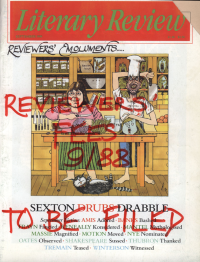Janet Barron
Pineapple of Politeness?
Sexing the Cherry
By Jeanette Winterson
Bloomsbury 166pp £12.95
Eating a hundred golden pippins in a single afternoon was the act of self-indulgence and dubious taste to which Jonathan Swift attributed the madness of his latest years. Sexing the Cherry is ripe with Swiftian tropes, from the Brobdingnagian heroine who makes men seem like Lilliputians, to the setting of the tale-within-a-tale on a flying island lightly adapted from the Laputa of Gulliver’s Travels. Fishiness, rather than juicy fruit, is Jeanette Winterson’s theme. In her first novel, The Passion, a lesbian had webbed feet: here, the malaise has spread inexorably upwards and a lover has turned into a mermaid.
Before Winterson read English at Oxford she worked as a beautician in a funeral parlour, and both of these experiences find their way into her writing. Sexing the Cherry is littered with corpses in various stages of dismemberment and literary necrophilia is the odour of the day. There are scents

Sign Up to our newsletter
Receive free articles, highlights from the archive, news, details of prizes, and much more.@Lit_Review
Follow Literary Review on Twitter
Twitter Feed
Under its longest-serving editor, Graydon Carter, Vanity Fair was that rare thing – a New York society magazine that published serious journalism.
@PeterPeteryork looks at what Carter got right.
Peter York - Deluxe Editions
Peter York: Deluxe Editions - When the Going Was Good: An Editor’s Adventures During the Last Golden Age of Magazines by Graydon Carter
literaryreview.co.uk
Henry James returned to America in 1904 with three objectives: to see his brother William, to deliver a series of lectures on Balzac, and to gather material for a pair of books about modern America.
Peter Rose follows James out west.
Peter Rose - The Restless Analyst
Peter Rose: The Restless Analyst - Henry James Comes Home: Rediscovering America in the Gilded Age by Peter Brooks...
literaryreview.co.uk
Vladimir Putin served his apprenticeship in the KGB toward the end of the Cold War, a period during which Western societies were infiltrated by so-called 'illegals'.
Piers Brendon examines how the culture of Soviet spycraft shaped his thinking.
Piers Brendon - Tinker, Tailor, Sleeper, Troll
Piers Brendon: Tinker, Tailor, Sleeper, Troll - The Illegals: Russia’s Most Audacious Spies and the Plot to Infiltrate the West by Shaun Walker
literaryreview.co.uk